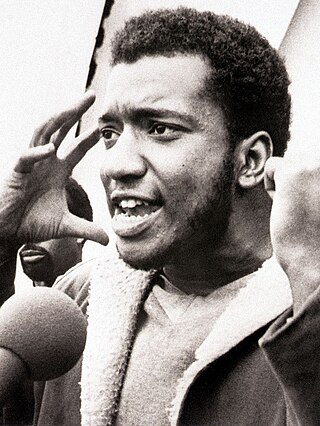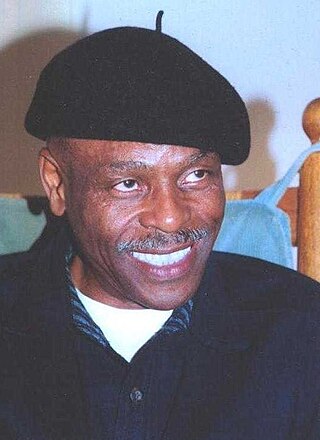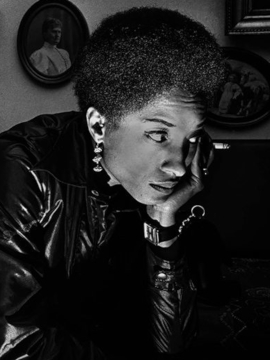
Fredrick "Chairman Fred" Allen Hampton Sr. was an American activist. He came to prominence in his late teens and very early 20s in Chicago as deputy chairman of the national Black Panther Party and chair of the Illinois chapter. As a progressive African American, he founded the anti-racist, anti-classist Rainbow Coalition, a prominent multicultural political organization that initially included the Black Panthers, Young Patriots, and the Young Lords, and an alliance among major Chicago street gangs to help them end infighting and work for social change. A Marxist–Leninist, Hampton considered fascism the greatest threat, saying "nothing is more important than stopping fascism, because fascism will stop us all."

Elaine Brown is an American prison activist, writer, singer, and former Black Panther Party chairwoman who is based in Oakland, California. Brown briefly ran for the Green Party presidential nomination in 2008.

The black power movement or black liberation movement was a branch or counterculture within the civil rights movement of the United States, reacting against its more moderate, mainstream, or incremental tendencies and motivated by a desire for safety and self-sufficiency that was not available inside redlined African American neighborhoods. Black power activists founded black-owned bookstores, food cooperatives, farms, media, printing presses, schools, clinics and ambulance services.

Alprentice "Bunchy" Carter was an American activist. Carter is credited as a founding member of the Southern California chapter of the Black Panther Party. Carter was shot and killed by a rival group, Ron Karenga's "Us", and is celebrated by his supporters as a martyr in the Black Power movement in the United States. Carter is portrayed by Gaius Charles in the 2015 TV series Aquarius.

The Free Breakfast for School Children Program, or the People’s Free Food Program, was a community service program run by the Black Panther Party that focused on providing free breakfast for children before school. The program began in January 1969 at Father Earl A. Neil's St. Augustine's Episcopal Church, located in West Oakland, California and spread throughout the nation. This program was an early manifestation of the social mission envisioned by Black Panther Party founders Huey P. Newton and Bobby Seale along with their founding of the Oakland Community School, which provided high-level education to 150 children from impoverished urban neighborhoods. The breakfasts formed the core of what became known as the party's Survival Programs. Inspired by contemporary research about the essential role of breakfast for optimal schooling and the belief that alleviating hunger and poverty was necessary for Black liberation, the Panthers cooked and served food to the poor inner city youth of the area. The service created community centers in various cities for children and parents to simultaneously eat and learn more about black liberation and the Black Panther Party's efforts.
Denis Percy Arnold Walker, also known as Bejam Kunmunara Jarlow Nunukel Kabool, was an Aboriginal Australian activist. He was a major figure in the civil rights and land rights movements of the 1970s and continued to fight for a treaty between the Australian Government and Aboriginal nations through the 1990s and until his death.

The New Panther Vanguard Movement (NPVM), originally known as the New African American Vanguard Movement (NAAVM) was created in South Central Los Angeles in 1994 as a response to the Los Angeles riots of 1992. Former members of the Black Panther Party and other community activists came together after the riots and shared their frustration with the lack of leadership in the Black community. After various dialogues, they decided to create a grassroots organization that would reflect the vision and community spirit of the Black Panther Party.

The Black Panther Party was a Marxist–Leninist and black power political organization founded by college students Bobby Seale and Huey P. Newton in October 1966 in Oakland, California. The party was active in the United States between 1966 and 1982, with chapters in many major American cities, including San Francisco, New York City, Chicago, Los Angeles, Seattle, and Philadelphia. They were also active in many prisons and had international chapters in the United Kingdom and Algeria. Upon its inception, the party's core practice was its open carry patrols ("copwatching") designed to challenge the excessive force and misconduct of the Oakland Police Department. From 1969 onward, the party created social programs, including the Free Breakfast for Children Programs, education programs, and community health clinics. The Black Panther Party advocated for class struggle, claiming to represent the proletarian vanguard.

B. Kwaku Duren is a controversial African American former lawyer, educator, writer, editor, Black Panther, long-time social, political and community activist; and a former convict who now lives and practices law in South Central Los Angeles. He has run for United States Congress three times and once for Vice President of the United States. As a young man, he spent nearly five years in California prisons for armed robbery. He began reading extensively and taking college classes while incarcerated and after his parole in the fall of 1970, he founded and chaired the National Poor People's Congress. A couple of years later, he and his younger sister, Betty Scott, along with Mary Blackburn and other community activists, founded an alternate school – the Intercommunal Youth Institute (1972–1975) – in Long Beach, California.

Donald Lee Cox, known as Field Marshal DC, was an early member of the leadership of the African American revolutionary leftist organization the Black Panther Party, joining the group in 1967. Cox was titled the Field Marshal of the group during the years he actively participated in its leadership, due to his familiarity with and writing about guns.

Ericka Huggins is an American activist, writer, and educator. She is a former leading member of the political organization, Black Panther Party (BPP). She was married to fellow BPP member John Huggins in 1968.

The Revolutionary People's Constitutional Convention (RPCC) was a conference organized by the Black Panther Party (BPP) that was held in Philadelphia from September 4–7, 1970. The goal of the Convention was to draft a new version of the United States Constitution and to unify factions of the radical left in the United States. The RPCC represented one of the largest gatherings of radical activists across movements and issues in the United States. The Convention was attended by a variety of organizations from the Black Power Movement, Asian American Movement, Chicano Movement, American Indian Movement, Anti-war movement, Women's Liberation, and Gay Liberation movements. Estimates of attendance range from 6,000 to 15,000. Attendees convened in workshops to draft declarations of demands related to various issues, which were ultimately intended to be incorporated into a new constitution which would function as the final vision of those movements. The RPCC also signified a shift in BPP focus from black self-defense to a broader revolutionary agenda. While conflicts did arise during the Philadelphia Convention, the conference was ultimately deemed a success by the Panthers. After the Philadelphia conference, attempts were made to reconvene to finalize and ratify the new constitution in Washington, DC a few months later but ultimately failed due to police interference and Panther disorganization.

The Black Panther was the official newspaper of the Black Panther Party. It began as a four-page newsletter in Oakland, California, in 1967, and was founded by Huey P. Newton and Bobby Seale. It was the main publication of the Party and was soon sold in several large cities across the United States, as well as having an international readership. The newspaper distributed information about the party's activities, and expressed through articles the ideology of the Black Panther Party, focusing on both international revolutions as inspiration and contemporary racial struggles of African Americans across the United States. It remained in circulation until the dissolution of the Party in 1980.
Judy Juanita is an American poet, novelist and playwright. She is a Lecturer in the College Writing Programs at the University of California, Berkeley. She was formerly a writing teacher at Laney College. In 1968, while attending San Francisco State, Juanita served as editor-in-chief of The Black Panther, the newspaper of the Black Panther Party. In her semi-autobiographical novel, Virgin Soul,, a black teen starts community college in Oakland, struggles to matriculate and then joins the Black Panther Party (BPP). The story of the female foot soldier in the black power movement, Virgin Soul exposes the unheralded women working behind-the-scenes in the BPP and the black student movement..

Constance Evadine Matthews, better known as Connie Matthews, was an organizer, a part of the Black Panther Party between 1968 and 1971. A resident of Denmark, she helped co-ordinate the Black Panthers with left-wing political groups based in Europe.
Nkenge Touré is a leader in the Reproductive Justice, Anti-Racism, and Black women's health movements and a former member of the Black Panther Party.

We Want Freedom: A Life in the Black Panther Party is a memoir written by Mumia Abu-Jamal and published in 2004 by South End Press. Written while on death row and adapted from his master thesis, it tells the story of the Black Panther Party branch of Philadelphia through Abu-Jamal's perspective, including discussion on the FBI's Counter Intelligence Program impact on the group and its eventual dissolution.

Walter Hall Lively, Jr. was an African American civil rights and socialist activist in Baltimore, MD, USA. A key figure in the Black Power and Black Arts Movements in Baltimore, Lively founded and headed several important organizations devoted to Black liberation and ending poverty. According to the Baltimore Sun, “National civil rights leaders publicly predicted he would be Baltimore’s first Black mayor.” His unexpected death at age 34 abruptly ended his political career.
JoNina Marie Abron-Ervin is an American journalist and activist. She became involved with the black power movement following the assassination of Martin Luther King Jr. and a trip she took to Rhodesia. While at university, she reported for several newspapers, including The Cincinnati Herald and The Chicago Defender. After graduating, she joined the Black Panther Party and was active in organising a number of its survival programs, as well as serving as editor of the party newspaper, The Black Panther. She remained in the party until its dissolution, she continued editing the academic journal The Black Scholar, and worked as a professor at Western Michigan University. Since her retirement, she has remained active in community organizing and anti-racist activism, and is affiliated with Black anarchism.














